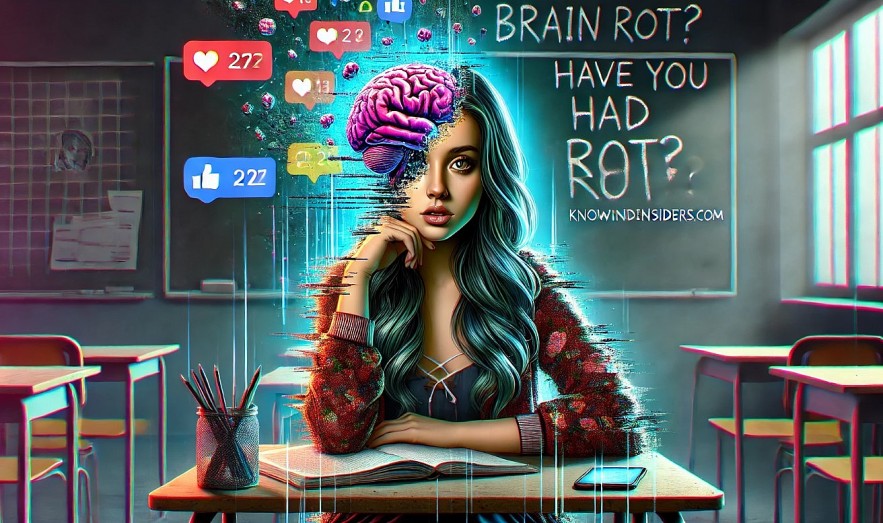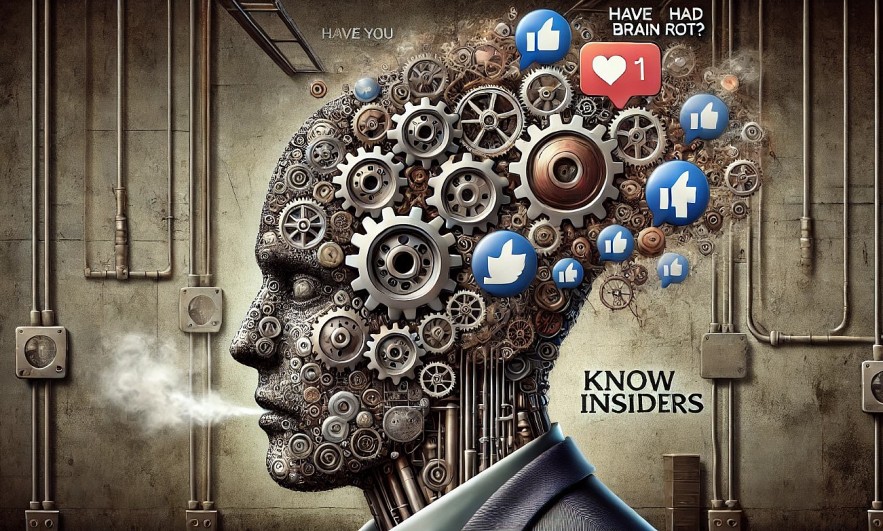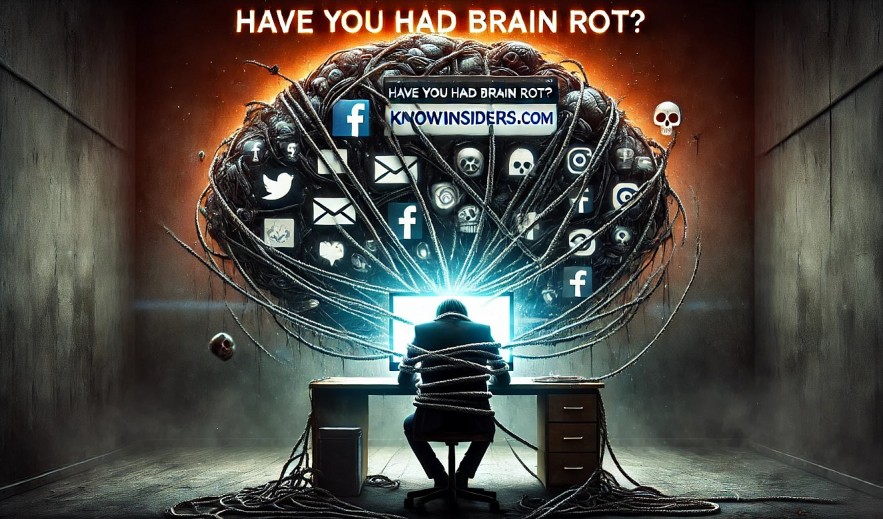Have You Got Brain Rot: Symptoms, Tips to Combat
 |
| Symptoms of Brain Rot |
The phrase "brain rot" has gained popularity in recent years, especially among younger generations, as a colloquial way to describe the cognitive fatigue, reduced attention span, and mental stagnation that often result from excessive exposure to social media and digital content.
What Is 'Brain Rot'? Symptoms of Brain Rot
"Brain rot" is a metaphorical expression, not a clinical diagnosis, that conveys a sense of intellectual and mental decay. It describes the feeling of being mentally "fried" after consuming low-quality, repetitive, or overwhelming amounts of content, particularly on platforms like TikTok, Instagram, and YouTube. The term suggests a loss of cognitive sharpness, creativity, and critical thinking, often replaced by feelings of emptiness, distraction, or stress.
- Symptoms of Brain Rot:
- Difficulty focusing or completing tasks.
- Increased anxiety or dissatisfaction with real life.
- A compulsion to check your phone despite wanting to stop.
- Memory issues and trouble retaining information.
- A sense of time slipping away without meaningful engagement.
Although the phrase is hyperbolic, its implications are serious. The rise of brain rot reflects societal concerns about how digital media consumption is reshaping our minds.
 |
| Do you have ‘brain rot’ from endless social media |
Why Did 'Brain Rot' Become the Oxford Word of the Year?
The Oxford Word of the Year often encapsulates a term that reflects global culture, concerns, or trends. In 2024, "brain rot" was chosen due to its widespread usage and its ability to articulate a collective experience in the digital age. Here are some reasons behind its selection:
1. Rising Digital Overload
The world has never been more connected, and social media platforms are designed to grab our attention at every turn. The average person now spends 2.5 hours daily on social media, with Gen Z averaging even higher. This constant engagement floods the brain with fragmented information and instant gratification, leading to cognitive exhaustion.
2. A Generational Cry for Help
"Brain rot" resonates particularly with younger generations, who are digital natives but also the most vulnerable to the negative effects of constant screen time. The term has become a way to voice frustration with addictive algorithms, societal pressures, and the pervasive influence of online culture.
3. A Symbol of the Post-Pandemic Era
The pandemic intensified screen dependency as work, school, and social lives moved online. This prolonged immersion in digital spaces left many people grappling with mental health issues and a diminished ability to disconnect.
4. Memes and Pop Culture
The term gained momentum through memes, TikTok trends, and internet discourse, highlighting the role of humor and relatability in spreading cultural phenomena. Ironically, the very platforms contributing to brain rot were instrumental in making it a global conversation.
The Science Behind Social Media and Cognitive Decline
1. The Dopamine Cycle
Social media exploits the brain's reward system by delivering quick bursts of dopamine, the "feel-good" neurotransmitter. Each like, share, or notification triggers a dopamine release, creating a cycle of anticipation and gratification. Over time, this diminishes the brain’s natural reward responses, leaving users seeking more stimulation but feeling less satisfied.
2. Attention Fragmentation
Constant scrolling trains the brain to process information in bite-sized chunks, making it harder to focus on long-form content or deep thinking. This phenomenon, often referred to as the "TikTokification" of attention, can lead to impatience and an inability to engage with more complex ideas.
3. Stress and Anxiety
Paradoxically, the platforms designed to connect us often leave users feeling isolated and anxious. The curated, idealized lives presented on social media can fuel comparison anxiety, while the sheer volume of information creates a sense of overload.
4. Memory Impairment
Studies suggest that passive consumption of social media reduces the brain's ability to encode memories effectively. Instead of engaging deeply with content, users skim and forget, contributing to a foggy, distracted state of mind.
How to Recognize If You Have Brain Rot
Questions to Ask Yourself:
Do you often feel mentally tired or unfocused after using your phone?
Have you noticed a decline in your attention span or memory?
Do you procrastinate important tasks by scrolling through social media?
Are you consuming more but learning or retaining less?
If your answer is "yes" to most of these, you might be experiencing the effects of brain rot.
How to Combat Brain Rot
 |
| How to Combat Brain Rot |
The good news is that brain rot is reversible. Here are actionable steps to reclaim your mental clarity and regain control over your digital habits:
1. Practice Digital Detox
Take regular breaks from screens to allow your brain to reset. Start small, like setting screen-free hours during meals or before bedtime, and gradually increase the duration.
2. Set Clear Boundaries
Use tools like app timers or focus modes to limit your daily social media use. For example, you might allow yourself only 30 minutes a day on certain apps.
3. Engage in Mindful Consumption
Be selective about the content you engage with. Follow accounts that inspire or educate you, and unfollow those that make you feel drained or inadequate.
4. Prioritize Deep Work
Train your brain to focus on single tasks for extended periods. Techniques like the Pomodoro Method or time blocking can help.
5. Replace Scrolling with Enriching Activities
Instead of scrolling, try activities that engage your brain and body, such as reading, journaling, exercising, or learning a new skill.
6. Stay Connected to Reality
Spend more time in face-to-face interactions and outdoor environments. Socializing in real life can counterbalance the artificial interactions of online spaces.
7. Seek Professional Help
If you feel overwhelmed by your screen habits or experience persistent mental health issues, consider talking to a therapist or counselor.
A Broader Cultural ShiftThe concept of brain rot also raises important questions about the responsibility of tech companies. Should platforms be held accountable for the addictive design of their algorithms? How can society balance the benefits of digital connectivity with the need for mental well-being? In recent years, movements advocating for ethical tech and digital mindfulness have gained traction. Governments and organizations are also stepping in, promoting media literacy and urging tech giants to prioritize user well-being over profit. |
Conclusion: A Call to Action
The declaration of "brain rot" as the Word of the Year is a wake-up call for individuals and society at large. It’s a reminder of the importance of intentional living in a world dominated by digital distractions. While social media can be a powerful tool for connection and creativity, its overuse can lead to profound mental and emotional consequences.
To avoid falling into the brain rot trap, we must cultivate awareness, set boundaries, and engage in activities that nourish the mind. By doing so, we can reclaim our mental clarity, foster deeper connections, and lead more fulfilling lives. After all, the antidote to brain rot is not to abandon technology altogether but to use it wisely, ensuring it serves us rather than the other way around.
























